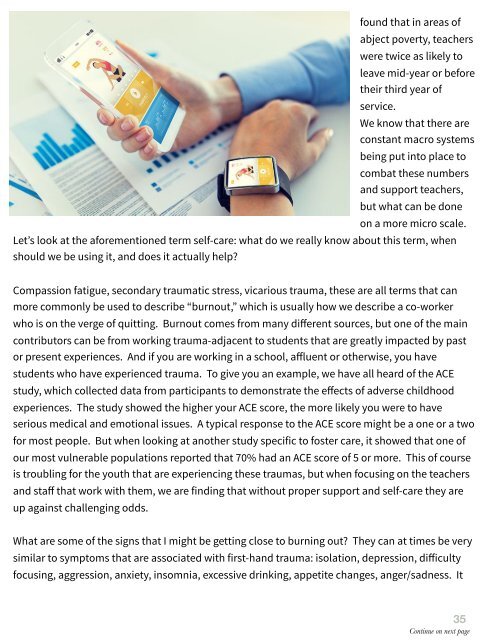May 2019 Foster Care Special Edition
Create successful ePaper yourself
Turn your PDF publications into a flip-book with our unique Google optimized e-Paper software.
found that in areas of<br />
abject poverty, teachers<br />
were twice as likely to<br />
leave mid-year or before<br />
their third year of<br />
service.<br />
We know that there are<br />
constant macro systems<br />
being put into place to<br />
combat these numbers<br />
and support teachers,<br />
but what can be done<br />
on a more micro scale.<br />
Let’s look at the aforementioned term self-care: what do we really know about this term, when<br />
should we be using it, and does it actually help?<br />
Compassion fatigue, secondary traumatic stress, vicarious trauma, these are all terms that can<br />
more commonly be used to describe “burnout,” which is usually how we describe a co-worker<br />
who is on the verge of quitting. Burnout comes from many different sources, but one of the main<br />
contributors can be from working trauma-adjacent to students that are greatly impacted by past<br />
or present experiences. And if you are working in a school, affluent or otherwise, you have<br />
students who have experienced trauma. To give you an example, we have all heard of the ACE<br />
study, which collected data from participants to demonstrate the effects of adverse childhood<br />
experiences. The study showed the higher your ACE score, the more likely you were to have<br />
serious medical and emotional issues. A typical response to the ACE score might be a one or a two<br />
for most people. But when looking at another study specific to foster care, it showed that one of<br />
our most vulnerable populations reported that 70% had an ACE score of 5 or more. This of course<br />
is troubling for the youth that are experiencing these traumas, but when focusing on the teachers<br />
and staff that work with them, we are finding that without proper support and self-care they are<br />
up against challenging odds.<br />
What are some of the signs that I might be getting close to burning out? They can at times be very<br />
similar to symptoms that are associated with first-hand trauma: isolation, depression, difficulty<br />
focusing, aggression, anxiety, insomnia, excessive drinking, appetite changes, anger/sadness. It<br />
35<br />
Continue on next page

















